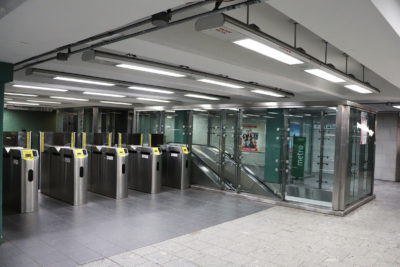
Machinists Union Local 264 Boston, a union representing bus mechanics at the Massachusetts Bay Transportation Authority, is fighting against potential privatization of their jobs with their campaign “Don’t Give Away the MBTA,” according to a press release from the INVEST NOW Coalition.
Local 264 launched the campaign this past Monday at a rally at the State Transportation Building to expose the track record of some of the companies Gov. Charlie Baker is considering to take control of core MBTA bus maintenance services, according to the release.
Mike Vartabedian, the business manager of Local 264, said the union has offered $29 million in annual savings to try and negotiate with Baker, but the discussions haven’t been successful and Baker is continuing with the plan to outsource jobs.
“This isn’t about savings, this is about ideology by the governor because we’re offering the savings and we’re the best in the nation and you’re not going to get that from a private company,” Vartabedian said. “We want to spread our story out to the community, taxpayers, the riders and voters in the state, who aren’t going to know what’s going on.”
Vartabedian said Baker has been planning to privatize the MBTA since his 2015 temporary suspension of the Taxpayer’s Protection Act, legislation that prevents privatization of the MBTA to protect taxpayers, in order to fix the MBTA after inclement weather shut down the T.
Vartabedian said Baker had promised to not privatize the T when he secured the suspension, but he is now going back on it.
“There’s never been a plan to not privatize,” Vartabedian said. “They keep insisting there is, that they’re willing to negotiate with us and talk to us, but if that was the case, they have instructions from the Fiscal [and] Management Control Board to negotiate with us.”
Nathanel DuBois, a bus mechanic at the MBTA, said because he has less than 10 years on the job, he is one of the most at-risk people for getting laid off. With a family of five and a newborn, he said he would not have any income to support them if he were to be unemployed.
“If this all goes through, myself and all of my fellow employees that have under 10 years would everything we’ve worked hard for,” DuBois said. “I’m going to have to go back to working three dead-end jobs just to make ends meet so that I can pay my bills. That takes me away from my newborn, that takes me away from my wife, my other two kids and everybody else.”
As a veteran, DuBois said the possibility of privatization is especially daunting to him.
“It just seems like the state talks about how they’re going to help veterans, how they want to do all of this stuff to ensure that veterans are taken care of, and I’m living proof that that’s not the way it is,” DuBois said. “I’m not saying veterans should have any more purpose than anybody else, but it’s big talk about trying to help us and at the end of the day, they’re letting us hang dry as well.”
Several residents of Boston said privatization could be a good idea, but it could also hurt the MBTA.
Brian Yee, 33, of Fenway, said the competition between the current laborers and private companies could be beneficial to riders.
“If there’s a way to privatize it, then I’m all for competition,” Yee said. “Competition is good for everybody — it’ll lower prices.”
Katie Fortier, 29, of Jamaica Plain, said private organizations could be unreliable when put into these positions.
“I’m not against privatization at all, but I think that in terms of it being something that is continuously funded … a private organization could pull out at any moment,” Fortier said. “That would leave the city of Boston in a real s**t storm, for lack of a better word. I worry about the sustainability of it if they’re a private organization that are being involved.”
Ferrier Delande, 30, of Dorchester, said if outsourcing the jobs to private companies slows down the buses, it will affect riders negatively.
“If it impacts the schedules, that I think run slow in general, if it makes it any worse, then I’m not here for it,” Delande said. “I’d rather keep everything in house with the unions. If it’s not broke, then why fix it?”




















































































































